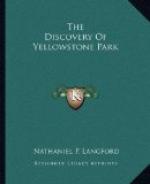“Requiescat in pace.”
Of our number, five—General Washburn, Walter Trumbull, Truman C. Everts, Jacob Smith and Lieutenant Doane—have died. The five members now surviving are Cornelius Hedges, Samuel T. Hauser, Warren C. Gillette, Benjamin Stickney and myself.
I have not been able to ascertain the date of death of either Walter Trumbull or Jacob Smith. Lieutenant Doane died at Bozeman, Montana, May 5, 1892. His report to the War Department of our exploration is a classic. Major Chittenden says:
His fine descriptions have never been surpassed by any subsequent writer. Although suffering intense physical torture during the greater portion of the trip, it did not extinguish in him the truly poetic ardor with which those strange phenomena seem to have inspired him.
Dr. Hayden, who first visited this region the year following that of our exploration, says of Lieutenant Doane’s report:
I venture to state as my opinion, that for graphic description and thrilling interest, it has not been surpassed by any official report made to our government since the times of Lewis and Clark.
Mr. Everts died at Hyattsville, Md., on the 16th day of February, 1901, at the age of eighty-five, survived by his daughter, Elizabeth Everts Verrill, and a young widow, and also a son nine years old, born when Everts was seventy-six years of age,—a living monument to bear testimony to that physical vigor and vitality which carried him through the “Thirty-seven days of peril,” when he was lost from our party in the dense forest on the southwest shore of Yellowstone lake.
General Washburn died on January 26, 1871, his death being doubtless hastened by the hardships and exposures of our journey, from which many of our party suffered in greater or less degree.
In an eloquent eulogistic address delivered in Helena January 29, 1871, Judge Cornelius Hedges said concerning the naming of Mount Washburn:
On the west bank of the Yellowstone, between Tower Fall and Hell-broth springs, opposite the profoundest chasm of that marvelous river canon, a mighty sentinel overlooking that region of wonders, rises in its serene and solitary grandeur,—Mount Washburn,—pointing the way his enfranchised spirit was so soon to soar. He was the first to climb its bare, bald summit, and thence reported to us the welcome news that he saw the beautiful lake that had been the proposed object of our journey. By unanimous voice, unsolicited by him, we gave the mountain a name that through coming years shall bear onward the memory of our gallant, generous leader. How little we then thought that he would be the first to live only in memory. * * * The deep forests of evergreen pine that embosom that lake shall typify the ever green spot in our memory where shall cluster the pleasant recollections of our varied experiences on that expedition.




